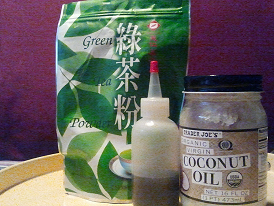Skin Biology  healthyskin.infopop.cc
healthyskin.infopop.cc  SKIN BIOLOGY OFFICIAL CHAT FORUM | Free Skin Consultation 1-800-405-1912
SKIN BIOLOGY OFFICIAL CHAT FORUM | Free Skin Consultation 1-800-405-1912  Products
Products  Safer Sunlight for Better Health
Safer Sunlight for Better Health  DIY Sunscreen
DIY Sunscreen
 healthyskin.infopop.cc
healthyskin.infopop.cc  SKIN BIOLOGY OFFICIAL CHAT FORUM | Free Skin Consultation 1-800-405-1912
SKIN BIOLOGY OFFICIAL CHAT FORUM | Free Skin Consultation 1-800-405-1912  Products
Products  Safer Sunlight for Better Health
Safer Sunlight for Better Health  DIY Sunscreen
DIY SunscreenModerators: Rosy
 Read-Only Topic
Read-Only TopicGo  | New  | Find  | Notify  | Tools  |
Location: Texas Registered: 21 April 2010 Posts: 10 | My skin seems to tolerate copper sun well, however I would like to add to it more protection such as mixing in a physical ingredient. Which one is best and where to purchase? Unfortunately I am exposed to quite a bit of sun and heat and high altitude rays about 3-4 days a week. All of this reading I am learning that my dermatologists recommendation of chemical sunscreen may have been contributing to my past melasma and hyper-pigmentation issues. I have been successfully treating this with retin-A, hydroguinone, occasional lactic acid peels, and TCA peels. Thanks! |
 Location: Skin Biology Registered: 15 September 2004 Posts: 7065 | Many people are asking us for physical ingredients to add to various skin products. We will probably start selling small amounts of GHK-copper, titanium dioxide, and so on for adding to other products.This message has been edited. Last edited by: Idelle Musiek, |
Location: Floriduh Registered: 10 March 2012 Posts: 17 | I would love something, Florida is hard on the skin. |
Location: Seattle Registered: 23 January 2012 Posts: 52 | Mix yourself some extra virgin coconut oil and green tea powder from your kitchen and smear it all over your skin and hair and you're good to go. Pacific Islanders did this regularly in the pre-contact era and still do this as the natural oil from coconuts not only moisturizes the skin but also serves as a natural UV protectant. Adding green tea to the oil carrier only boosts UV protection. For a natural mosquito repellent, rub yourself with the skin from any citrus fruit (lemon, lime, orange, calamansi, etc.). The oils from the citrus peels will repel mosquitos, flies, and wasps. Also, you can squeeze out the citrus juice from the fruit add H2O and place into a spray bottle. Spray yourself, especially around the ears, neck and exposed appendages and you'll be bite free. I do this whenever I go boonie stomping in Micronesia.  |
Location: Texas Registered: 21 April 2010 Posts: 10 | Bump. The copper sun seems to be improving my sun damage on the back of my hands as well as a little lifting in the eye area, is this possible? |
Location: Texas Registered: 21 April 2010 Posts: 10 | Awesome! In addition to your sun product and day cover (tried both), I had been using obagi to manage melasma. Would you recommend continuing a hydroquinone product to maintain, or should my progress remain the same with copper peptides? I am down to just the #5 blender that I use with retin A every few days. |
 Location: Skin Biology Registered: 15 September 2004 Posts: 7065 | I would advise you to throw the hydroquinone away. From Wikipedia Skin depigmentation In human medicine, hydroquinone is used as a topical application in skin whitening to reduce the color of skin. It does not have the same predisposition to cause irritation as metol does. This use is banned in some countries, including the member states of the European Union under Directive 76/768/EEC:1976.[2][3] In 2006, the United States Food and Drug Administration revoked its previous approval of hydroquinone and proposed a ban on all over-the-counter preparations.[4] The FDA stated that hydroquinone cannot be ruled out as a potential carcinogen. This conclusion was reached based on the extent of absorption in humans and the incidence of neoplasms in rats in several studies where adult rats were found to have increased rates of tumours, including thyroid follicular cell hyperplasias, anisokaryosis, mononuclear cell leukemia, hepatocellular adenomas and renal tubule cell adenomas. The Campaign for Safe Cosmetics has also highlighted concerns.[5] Numerous studies have revealed that hydroquinone can cause exogenous ochronosis, a disfiguring disease in which blue-black pigments are deposited onto the skin, if taken orally; however, skin preparations containing the ingredient are administered topically. The FDA has classified hydroquinone currently as a safe product, as currently used.[4][6] While using hydroquinone as lightening agent can be effective with proper use, it can also cause skin sensitivity. Using a daily sunscreen with a high PPD (persistent pigment darkening) rating reduces the risk of further damage. Hydroquinone is sometimes combined with alpha hydroxy acids that exfoliate the skin to quicken the lightening process. In the United States, topical treatments usually contain up to 2% in hydroquinone. Otherwise, higher concentrations (up to 4%) should be prescribed and used with caution.This message has been edited. Last edited by: SkinBiologyWebmaster, |
Location: Texas Registered: 21 April 2010 Posts: 10 |
Done. This is interesting to me for reasons I'd rather not mention here... Sticking with super cp serum, emu oil, copper sun or day cover, and lactic acid cream. And most days I use a fairly assertive exfoliation gloves which I love. My skin is pretty strong and youthful looking for my age 43. I often get comments that I look in my twenties. Just a faded mask of annoying melasma that I cover with mineral makeup. |
| Powered by Social Strata |
| Please Wait. Your request is being processed... |
 Read-Only Topic
Read-Only Topic